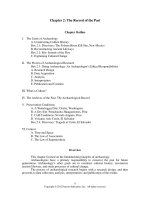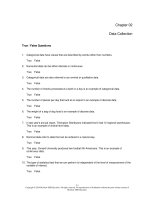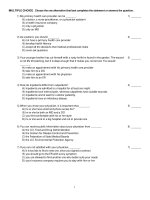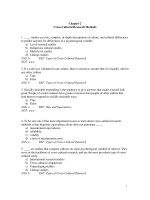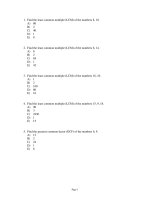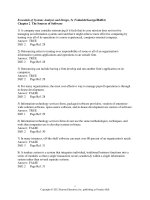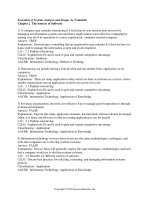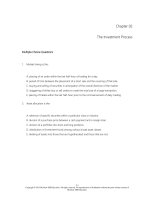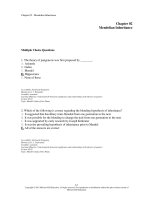Essentials of systems analysis and design 5th edition valacich test bank
Bạn đang xem bản rút gọn của tài liệu. Xem và tải ngay bản đầy đủ của tài liệu tại đây (48.51 KB, 16 trang )
Essentials of Systems Analysis and Design, 5e (Valacich/George/Hoffer)
Chapter 2 The Sources of Software
1) A company may consider outsourcing if it feels that its core mission does not involve
managing an information systems unit and that it might achieve more effective computing by
turning over all of its operations to a more experienced, computer-oriented company.
Answer: TRUE
Diff: 2
Page Ref: 28
2) Outsourcing refers to turning over responsibility of some or all of an organization's
information systems applications and operations to an outside firm.
Answer: TRUE
Diff: 2
Page Ref: 28
3) Outsourcing can include having a firm develop and run another firm's application on its
computers.
Answer: TRUE
Diff: 2
Page Ref: 28
4) For many organizations, the most cost-effective way to manage payroll operations is through
in-house development.
Answer: FALSE
Diff: 2
Page Ref: 28
5) Information technology services firms, packaged software providers, vendors of enterprisewide solution software, open-source software, and in-house development are sources of software.
Answer: TRUE
Diff: 1
Page Ref: 29
6) Information technology services firms do not use the same methodologies, techniques, and
tools that companies use to develop systems in-house.
Answer: FALSE
Diff: 2
Page Ref: 30
7) In many instances, off-the-shelf software can meet over 80 percent of an organization's needs.
Answer: FALSE
Diff: 3
Page Ref: 31
8) A turnkey system is a system that integrates individual, traditional business functions into a
series of modules so that a single transaction occurs seamlessly within a single information
system rather than several separate systems.
Answer: FALSE
Diff: 2
Page Ref: 31
1
Copyright © 2012 Pearson Education, Inc. publishing as Prentice Hall
9) Referencing enterprise solutions, the difference between the modules and traditional
approaches is that the modules are integrated to focus on the business functional areas, rather
than on business processes.
Answer: FALSE
Diff: 3
Page Ref: 31
10) Using enterprise software solutions, a firm can integrate all parts of a business process in a
unified information system.
Answer: TRUE
Diff: 2
Page Ref: 31
11) One of the primary benefits of using an enterprise software solution is the short time period
required for implementation.
Answer: FALSE
Diff: 2
Page Ref: 31
12) The concept of a third-party provider running applications at remote sites and charge rent or
a licensing fee to the organization is called cloud computing.
Answer: TRUE
Diff: 2
Page Ref: 32
13) By 2013, over half of all the world's corporate computing will be done using cloud
computing.
Answer: TRUE
Diff: 2
Page Ref: 32
14) One reason for cloud computing is that it frees up internal staff.
Answer: TRUE
Diff: 2
Page Ref: 32
15) Cloud computing is slower in allowing a user accesss to internal applications.
Answer: FALSE
Diff: 2
Page Ref: 32
16) Cloud computing is a low-cost access method to corporate quality data.
Answer: TRUE
Diff: 2
Page Ref: 32
17) The primary concern of cloud computing is reliability.
Answer: TRUE
Diff: 2
Page Ref: 32
18) Cloud computing always complies with government regulations.
Answer: FALSE
Diff: 2
Page Ref: 32
2
Copyright © 2012 Pearson Education, Inc. publishing as Prentice Hall
19) Open-source software is freely available.
Answer: TRUE
Diff: 2
Page Ref: 33
20) Open-source software is developed by employees of a particular company.
Answer: FALSE
Diff: 2
Page Ref: 33
21) The source code itself is not freely available for open-source software.
Answer: FALSE
Diff: 2
Page Ref: 33
22) Money can be made with open-source software by providing maintenance and other services.
Answer: TRUE
Diff: 2
Page Ref: 33
23) Despite all the alternative sources of software, in-house development is still an option.
Answer: TRUE
Diff: 2
Page Ref: 33
24) When a supported task is generic, you would go to a packaged software producer to obtain
the software.
Answer: TRUE
Diff: 2
Page Ref: 33
25) When resources and staff are available and a system must be built from scratch, you would
go with a packaged software producer to obtain the software.
Answer: FALSE
Diff: 2
Page Ref: 33
26) Enterprise solutions vendors are best for complete systems that cross functional boundaries.
Answer: TRUE
Diff: 2
Page Ref: 33
27) Cloud computing is best when a supported task is generic and one does not need instant
access.
Answer: FALSE
Diff: 2
Page Ref: 33
28) Open-source software is best used when cost is an issue.
Answer: FALSE
Diff: 2
Page Ref: 33
29) Issues of functionality help determine whether the system should be developed and run inhouse, software and hardware selection, implementation, and organizational limitations.
Answer: TRUE
Diff: 2
Page Ref: 33
3
Copyright © 2012 Pearson Education, Inc. publishing as Prentice Hall
30) When choosing off-the-shelf software, cost, functionality, response time, and ease of
installation are several of the common criteria that should be considered.
Answer: TRUE
Diff: 2
Page Ref: 33-34
31) When choosing off-the-shelf software, the two most important criteria are functionality and
ease of installation.
Answer: FALSE
Diff: 2
Page Ref: 33-34
32) Functionality refers to the tasks the software can perform and the mandatory, essential, and
desired system features.
Answer: TRUE
Diff: 2
Page Ref: 34
33) Purchased software cannot be modified.
Answer: FALSE
Diff: 1
Page Ref: 35
34) If a company purchases application software, it does not necessarily need to conduct systems
analysis.
Answer: FALSE
Diff: 2
Page Ref: 34
35) Ease of installation is a measure of the difficulty of loading the software and making it
operational.
Answer: TRUE
Diff: 2
Page Ref: 35
36) Requiring prospective software vendors to install their software for a limited time on your
computers is one way to validate purchased software information.
Answer: TRUE
Diff: 2
Page Ref: 35
37) A document provided to vendors to ask them to propose hardware and system software that
will meet the requirements of your new system is a request for proposal.
Answer: TRUE
Diff: 2
Page Ref: 35
38) Reuse is the use of previously written software resources, especially objects and components,
in new applications.
Answer: TRUE
Diff: 2
Page Ref: 37
39) Reuse will not increase programmer productivity.
Answer: FALSE
Diff: 2
Page Ref: 37
4
Copyright © 2012 Pearson Education, Inc. publishing as Prentice Hall
40) Reuse should increase development time.
Answer: FALSE
Diff: 2
Page Ref: 37
41) Because existing pieces of software have already been tested, reusing them tends to result in
higher-quality software with lower defect rates, decreasing maintenance costs.
Answer: TRUE
Diff: 2 Page Ref: 36
42) Reuse is most commonly applied to object-oriented and component-based development.
Answer: TRUE
Diff: 2
Page Ref: 36
43) Component-based development's focus is on creating specific pieces of software that can
only be used once.
Answer: FALSE
Diff: 2
Page Ref: 37
44) Research has found that reuse of object class libraries resulted in decreased productivity.
Answer: FALSE
Diff: 2
Page Ref: 37
45) The reuse of object class libraries has been found to reduce defect density.
Answer: TRUE
Diff: 2
Page Ref: 37
46) Rework can be reduced by reusing object class libraries.
Answer: TRUE
Diff: 2
Page Ref: 37
47) Due to the low cost of developing a reusable component, most organizations can compete
economically with established commercial organizations that focus on selling components as
their main line of business.
Answer: FALSE
Diff: 3
Page Ref: 37
48) Strategic business goals of the organization must be matched to the organizations approach
to off-the-shelf software.
Answer: FALSE
Diff: 2
Page Ref: 37
49) The benefits of reuse grow as more corporate experience is gained from it.
Answer: TRUE
Diff: 2
Page Ref: 37
5
Copyright © 2012 Pearson Education, Inc. publishing as Prentice Hall
50) As more corporate experience is gained from reuse, costs and the amount of resources
necessary for reuse to work well.
Answer: TRUE
Diff: 2
Page Ref: 37
51) One of the three basic steps of software reuse is abstraction.
Answer: TRUE
Diff: 2
Page Ref: 37
52) One of the three basic steps of software reuse is documentation.
Answer: FALSE
Diff: 2
Page Ref: 37
53) Storage refers to making software assets available for others to use.
Answer: FALSE
Diff: 2
Page Ref: 37
54) The practice of turning over responsibility of some or all of an organization's information
systems applications and operations to an outside firm is referred to as:
A) realignment.
B) downsizing.
C) outsourcing.
D) time sharing.
E) system reassignment and deployment.
Answer: C
Diff: 2
Page Ref: 28
55) When developing information systems, an organization could use:
A) an information technology services firm.
B) open-source software.
C) cloud computing.
D) in-house development.
E) all of the above.
Answer: E
Diff: 1
Page Ref: 29
56) Packaged software producers create software such as:
A) R/3.
B) Excel.
C) Linux.
D) Firefox.
Answer: B
Diff: 1
Page Ref: 30
6
Copyright © 2012 Pearson Education, Inc. publishing as Prentice Hall
57) A system that integrates individual traditional business functions into a series of modules so
that a single transaction occurs seamlessly within a single information system rather than several
separate systems best describes:
A) enterprise resource planning (ERP).
B) application service.
C) storage area network.
D) packaged software.
E) system integration software.
Answer: A
Diff: 2
Page Ref: 31
58) All of the following are benefits of enterprise solutions, EXCEPT:
A) a single repository of data for all business processes.
B) module flexibility.
C) immediate integration of new modules.
D) shifting toward enterprise solutions means changing business processes.
E) shifting from separate systems to a seamless, integrated system.
Answer: D
Diff: 2
Page Ref: 31
59) The provision of computing resources over the Internet so that customers do not need to
invest in infrastructure is called:
A) cloud computing.
B) raindrop computing.
C) leased computing.
D) centralized computing.
E) none of the above.
Answer: A
Diff: 2
Page Ref: 32
60) All of the following are reasons to go with cloud computing EXCEPT:
A) freeing internal IT staff.
B) gaining access to applications faster.
C) reduced development time.
D) achieving lower cost access to corporate-quality applications.
E) A and B.
Answer: C
Diff: 2
Page Ref: 32
61) The primary concern about cloud computing is:
A) cost.
B) reliability.
C) compliance with standards.
D) dependability.
E) sustainability.
Answer: B
Diff: 2
Page Ref: 32
7
Copyright © 2012 Pearson Education, Inc. publishing as Prentice Hall
62) Open-source software is developed by:
A) in-house developers.
B) employees of a particular company.
C) communities of interested people.
D) consultants.
E) application service providers.
Answer: C
Diff: 2
Page Ref: 32
63) An organization should acquire software from in-house developers when:
A) the supported task is generic.
B) complete systems that cross functional boundaries are needed.
C) the task requires custom support and the system cannot be built internally.
D) the resources and staff are available and the system must be built from scratch.
E) None of the above is correct.
Answer: D
Diff: 2
Page Ref: 33
64) Which of the following describes the internal staffing requirements when software
components are acquired from packaged software producers?
A) Some internal staff are necessary, but mostly consultants are needed.
B) Some information systems (IS) and user staff to define requirements and evaluate packages
are needed.
C) Internal staff may be needed, depending on the application.
D) Internal staff are necessary, though staff size may vary.
E) None of the above is correct.
Answer: B
Diff: 2
Page Ref: 33
65) Which of the following describes the internal staffing requirements when software
components are acquired from enterprise-wide solutions providers?
A) Some internal staff are necessary, but mostly consultants are needed.
B) Some IS and user staff to define requirements and evaluate packages are needed.
C) Internal staff may be needed, depending on the application.
D) Internal staff are necessary, though staff size may vary.
E) None of the above is correct.
Answer: A
Diff: 2
Page Ref: 33
8
Copyright © 2012 Pearson Education, Inc. publishing as Prentice Hall
66) Which of the following are common criteria to consider when selecting off-the-shelf
software?
A) Flexibility
B) Vendor viability
C) Functionality
D) Cost
E) All of the above
Answer: E
Diff: 1
Page Ref: 33-34
67) Two criteria that are always among the most important when choosing software are:
A) ease of installation & flexibility.
B) response time & vendor support.
C) vendor support & vendor viability.
D) cost & functionality.
E) functionality & documentation.
Answer: A
Diff: 3
Page Ref: 34
68) In terms of criteria to consider when choosing off-the-shelf software, ease of customization
is also referred to as:
A) response time.
B) documentation.
C) functionality.
D) flexibility.
E) None of the above is correct.
Answer: D
Diff: 3
Page Ref: 35
69) In terms of criteria to consider when choosing off-the-shelf software, documentation refers to
all of the following EXCEPT:
A) user's manuals.
B) technical documentation.
C) the cost for multiple copies.
D) the baseline project plan.
E) how understandable the documentation is.
Answer: D
Diff: 3
Page Ref: 35
9
Copyright © 2012 Pearson Education, Inc. publishing as Prentice Hall
70) Which of the following are ways of validating purchased software information?
A) Reviewing software documentation and technical marketing literature
B) Sending prospective vendors a questionnaire asking specific questions about their packages
C) Using the software yourself and running it through a series of tests based on the criteria for
selecting software
D) Obtaining feedback from other users of the software
E) All of the above
Answer: E
Diff: 2
Page Ref: 35-36
71) The document sent to vendors asking them to propose hardware and software that will meet
the requirements of your new system is called a:
A) requirements statement.
B) request for proposal (RFP).
C) Baseline Project Plan.
D) business case.
E) systems service request.
Answer: B
Diff: 2
Page Ref: 35
72) The use of previously written software resources is also referred to as:
A) reuse.
B) reengineering.
C) reprocessing.
D) re-analysis.
E) restructuring.
Answer: A
Diff: 2
Page Ref: 36
73) Reuse typically refers to using previously written:
A) objects.
B) components.
C) documentation.
D) business cases.
E) Both A and B are correct.
Answer: E
Diff: 2
Page Ref: 36
74) Reusing software can:
A) increase the cost of software development.
B) decrease development time.
C) increase development time.
D) increase schedule overruns.
E) decrease programmer productivity.
Answer: B
Diff: 2
Page Ref: 36
10
Copyright © 2012 Pearson Education, Inc. publishing as Prentice Hall
75) Which of the following is NOT a result of reuse?
A) Higher-quality software
B) Lower defect rates
C) Decreased maintenance costs
D) Higher defect rates
Answer: D
Diff: 2
Page Ref: 36
76) Technical issues related to reuse include all of the following EXCEPT:
A) the over-reliance on class libraries.
B) lack of a methodology for creating reusable components.
C) lack of a methodology for clearly defining reusable components.
D) the small number of reusable resources available.
E) the small number of reliable resources available.
Answer: A
Diff: 2
Page Ref: 37
77) The four approaches to reuse include all of the following EXCEPT:
A) ad hoc.
B) facilitated.
C) managed.
D) designed.
E) ex ante.
Answer: E
Diff: 2
Page Ref: 38
78) The typical reuse level of facilitated reuse:
A) varies.
B) is low.
C) is high.
D) is very high.
E) is moderate.
Answer: B
Diff: 2
Page Ref: 38
79) The typical reuse level of designed reuse:
A) varies.
B) is low.
C) is moderate.
D) is high.
E) is none to low.
Answer: D
Diff: 2
Page Ref: 38
11
Copyright © 2012 Pearson Education, Inc. publishing as Prentice Hall
80) The relative cost of ad hoc reuse is:
A) low.
B) none.
C) moderate.
D) high.
E) extremely high.
Answer: A
Diff: 2
Page Ref: 38
81) When an organization invests in carefully designing assets for reuse, choosing assets for
domain or product line, they are said to be engaged in:
A) ad hoc reuse.
B) facilitated reuse.
C) designed reuse.
D) managed reuse.
E) ex ante reuse.
Answer: C
Diff: 2
Page Ref: 38
82) When an organization encourages and supports use with limited resources, infrastructure,
and policies to make reuse easier, they are said to be engaged in:
A) ad hoc reuse.
B) managed reuse.
C) ex ante reuse.
D) facilitated reuse.
E) designed reuse.
Answer: D
Diff: 2
Page Ref: 38
83) With managed reuse, the development, sharing, and adoption of reusable assets is:
A) encouraged.
B) mandated.
C) discouraged.
D) minimal.
E) All of the above are correct.
Answer: B
Diff: 2
Page Ref: 38
12
Copyright © 2012 Pearson Education, Inc. publishing as Prentice Hall
Match each of the following terms with the reason for why you would
go with that provider.
a.
b.
c.
d.
e.
f.
IT services firm
Packaged software producers
Enterprise solutions vendors
Cloud computing
Open-source software
In-house developers
84) For complete systems that cross functional boundaries
Answer: c
Diff: 2
Page Ref: 33
85) When resources and staff are available and system must be built from scratch
Answer: f
Diff: 2
Page Ref: 33
86) When task requires custom support and system can't be built internally or system needs to be
sourced
Answer: a
Diff: 2
Page Ref: 33
87) For instant access to an application
Answer: d
Diff: 2
Page Ref: 33
88) When supported task is generic
Answer: b
Diff: 2
Page Ref: 33
89) When supported task is generic but cost is an issue
Answer: e
Diff: 2
Page Ref: 33
13
Copyright © 2012 Pearson Education, Inc. publishing as Prentice Hall
Match each of the following terms with its corresponding description.
a.
b.
c.
d.
e.
f.
g.
h.
Ease of installation
Vendor Support
Viability of Vendor
Flexibility
Functionality
Request for proposal
Response time
Documentation
90) Refers to whether and how much a vendor can assist in installing the software, how much
training and support is provided, and how much help can be provided to solve problems after
installation
Answer: b
Diff: 2
Page Ref: 34
91) Refers to how long it takes the software package to respond to the user's request in an
interactive session
Answer: g
Diff: 2
Page Ref: 35
92) Refers to the vendor's ability to remain in business
Answer: c
Diff: 2
Page Ref: 35
93) A document provided to vendors to ask them to propose hardware and system software that
will meet the requirements of your new system
Answer: f
Diff: 2
Page Ref: 35
94) Refers to how easy it is for you, or the vendor, to customize the software
Answer: d
Diff: 2
Page Ref: 35
95) Refers to the tasks the software can perform and the mandatory, essential, and desired system
features
Answer: e
Diff: 2
Page Ref: 34
96) Refers to the availability and cost of user manuals and other technical paper work associated
with the software
Answer: h
Diff: 2
Page Ref: 35
14
Copyright © 2012 Pearson Education, Inc. publishing as Prentice Hall
Match each of the following terms with its corresponding description.
a.
b.
c.
d.
Ad Hoc Reuse
Facilitated Reuse
Managed Reuse
Designed Reuse
97) Individuals find assets on their own, sharing with colleagues as they choose.
Answer: a
Diff: 2
Page Ref: 38
98) Organization enforces reuse practice through policies, resources, tools, and people.
Answer: c
Diff: 2
Page Ref: 38
99) Organization invests in carefully designing assets for reuse, choosing assets for domain or
product line. Assets are designed or reengineered to fit together.
Answer: d
Diff: 2
Page Ref: 38
100) Organization encourages and supports reuse with limited resources, infrastructure, and
policies to make reuse easier.
Answer: b
Diff: 2
Page Ref: 38
101) Identify and discuss the 6 sources of software.
Answer: Information technology services firms help companies develop custom information
systems for internal use. They develop, host, and run applications for customers, or they provide
other services. Packaged software producers are companies who develop generic applications
and then sell them in larger retail outlets. Enterprise solutions consist of a series of integrated
modules that provide a single repository for all data. Application and Managed service providers
remotely host and run computer applications for other companies. Managed service providers, in
addition, provide network-based services, customized applications, and even equipment. Open
source software is developed by a community of interested people and is free, including the
source code. Finally, in-house development occurs in the organization when resources and staff
are available.
Diff: 2
Page Ref: 29-33
102) Discuss cloud computing and how it can benefit an organization.
Answer: Cloud computing allows an organization to rent or license applications from third-party
providers. The applications are run at remote sites, thus freeing the organization from
maintaining the application and associated hardware. Users pay for the software on either a peruse basis or month-to-month. One example of a clouding computing application is Google apps.
Diff: 3
Page Ref: 32
15
Copyright © 2012 Pearson Education, Inc. publishing as Prentice Hall
103) Discuss the future market for cloud computing.
Answer: According to Merrill Lynch, by 2013, twelve percent of corporate computing will be
done by cloud computing. The total market for cloud computing is expected to be $160 billion.
Companies that are expected to profit most are the ones that can react quickly to adjust their
profit lines to include cloud computing.
Diff: 3
Page Ref: 32
104) Identify four ways that purchased software information can be validated.
Answer: Information about purchased software can be collected from the vendor; you can
actually use the software (software, training materials, documentation, and technical support
facilities); you can obtain feedback from other users, and you can use independent software
testing services.
Diff: 2
Page Ref: 35-36
105) Identify the most common criteria for choosing off-the-shelf software. Which two criteria
would be among the most important?
Answer: The most common criteria are cost, functionality, vendor support, vendor viability,
flexibility, documentation, response time, and ease of installation. Cost involves comparing the
cost of developing the same system in-house to the cost of purchasing or licensing the software
package. Functionality refers to the tasks the software can perform and the mandatory, essential,
and desired system features. While vendor support identifies the amount of support the vendor
can be expected to provide, vendor viability examines the vendor's marketplace strength.
Flexibility refers to the flexibility of customizing the software. The documentation criterion
examines issues relating to the user's manual, technical documentation, and cost of acquiring
additional copies of the documentation. Response time questions the length of time it takes the
software package to respond to the user's requests in an interactive session and how long it takes
the software to complete running a job. The ease of installation criterion examines the difficulty
of loading the software and making it operational. Vendor support and viability will be among
the most important.
Diff: 3
Page Ref: 33-35
106) What is reuse and why is it increasing in popularity?
Answer: Reuse is the use of previously written software resources in new applications. It is
increasing in popularity because developers can use generic bits and pieces of code that do not
have to be rewritten. This should increase programmer productivity, decrease development time,
minimize scheduling overruns and tend to result in higher-quality software with lower defect
rates, which can decrease maintenance costs.
Diff: 2
Page Ref: 36
107) What are the four approaches to reuse?
Answer: An organization can take four approaches to reuse. Ad hoc reuse allows individuals to
find or develop reusable assets on their own. Another approach, facilitated reuse, developers are
not required to practice reuse but are encouraged to do so. Managed reuse mandates the
development, sharing and adoption of reusable assets. The organization does this by establishing
policies and procedures for reuse. The last approach, designed reuse, mandates that components
are designed for reuse as they are being developed for a specific application.
Diff: 2
Page Ref: 38
16
Copyright © 2012 Pearson Education, Inc. publishing as Prentice Hall
